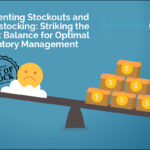
In the complex world of inventory management, dead stock represents a critical yet often overlooked challenge that businesses face. It not only occupies precious warehouse space but it also ties up capital that could otherwise be invested in more profitable ventures. This blog post dives deep into the concept of dead stock, its significant impact on businesses, and offers strategic insights on minimizing its occurrence.
What Is Dead Stock?
Dead stock refers to items that have never been sold or used by a business due to becoming outdated, damaged, or overstocked, and are unlikely to be sold in the future. This situation typically arises from several factors such as poor demand forecasting, impulsive purchasing decisions, and lack of a robust inventory management strategy. Dead stock can include anything from seasonal items, outdated technology, and fashion apparel to perishable goods past their sell-by date.
The Impact of Dead Stock
The ramifications of dead stock on a business’s bottom line can be significant and manifold financially, operationally, and growth-wise.
Financial Costs
Dead stock is not just a physical entity taking up space; it’s a financial burden that eats into a business’s liquidity. Capital tied up in inventory that doesn’t move cannot be used for growth or investment in new products. Additionally, storing unsellable inventory incurs costs related to warehouse space, insurance, and potential disposal. These financial implications highlight the importance of efficient stock control and overstock management.
Operational Costs
From an operational perspective, dead stock complicates inventory management processes, making it harder to organize and manage warehouse space efficiently. Misplaced inventory due to crowded warehouses can lead to increased labor costs as employees spend more time searching for products. This inefficiency not only affects day-to-day operations but also impacts customer satisfaction due to potential delays in order fulfillment.
Growth Impact
Perhaps one of the most detrimental effects of dead stock is on a business’s growth potential. Resources locked in non-moving inventory could be better spent on marketing efforts, expanding product lines, or exploring new markets. Furthermore, valuable warehouse space occupied by dead stock represents a missed opportunity to stock more in-demand items, directly impacting a business’s ability to meet customer needs and expand its market presence.
Minimizing Dead Stock
Addressing dead stock requires a proactive approach in inventory management, coupled with strategic measures for dealing with existing dead inventory.
Proactive Inventory Management
At the core of preventing dead stock lies effective inventory management, which starts with accurate demand forecasting. Anticipating market trends and customer preferences allows businesses to adjust their purchase orders accordingly, reducing the risk of overstocking. Implementing an advanced inventory management system can provide valuable insights into sales patterns, helping to optimize stock levels.
Additionally, partnering with a fulfillment company can offer flexibility in inventory management, allowing businesses to respond more adeptly to market changes.
Strategies for Dealing with Dead Stock
When dead stock is inevitable, businesses can explore various strategies to mitigate its impact. Promotions, discounts, or bundling unsold items with popular products can help clear out inventory without a total loss.
Liquidation channels, donations, or recycling are also viable options for the responsible disposal of dead stock while potentially recouping some costs. The key here is to act swiftly to minimize storage costs and free up warehouse space for new, sellable inventory.
Partner with the Team at APS Fulfillment, Inc. for Efficient Supply Chain Management
Implementing strong supply chain management practices, prioritizing demand forecasting, and adopting proactive stock control measures are essential steps in minimizing the impact of dead stock. While it may not be possible to eliminate dead stock entirely, strategic management can significantly reduce its occurrence and adverse effects on your business.
Are you ready to take control of your inventory management and minimize dead stock? Partner with APS Fulfillment, Inc. today! APS Fulfillment, Inc. provides full-service third-party logistics services out of Miami. With years of experience in the logistics industry, we offer comprehensive services including inventory management, order fulfillment, and shipping.
Get in touch with us and one of our consultants will tailor a fulfillment plan designed to grow your business. Book a consultation by calling (954) 582-7450 or email [email protected]






